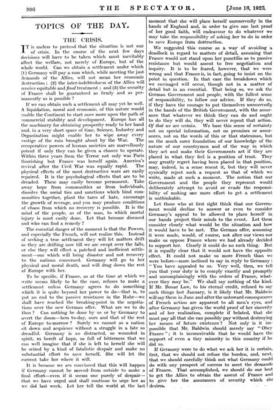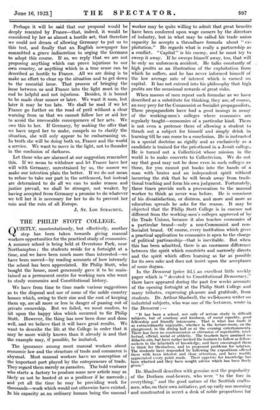TOPICS OF THE DAY.
THE CRISIS.
IT is useless to pretend that the situation is not one of crisis. In the course of the next few days decisions will have to be taken which must inevitably affect the welfare, not merely of Europe, but of the whole world. Can we obtain a settlement under which (1) Germany will pay a sum which, while meeting the just demands of the Allies, will not mean her economic destruction ; (2) the inter-indebtedness of the Allies will receive equitable and final treatment ; and (3) the security of France shall be guaranteed as firmly and as per- -manently as is possible ?
If we can obtain such a settlement all may yet be well. A liquidation, moral and economic, of this nature would enable the Continent to start once more upon the path of commercial stability and development. Europe has all the machinery for obtaining prosperity ready to her hand -and, in a very short space of time, Science, Industry and Organization might enable her to wipe away every vestige of the ruin brought about by the War. The recuperative powers of human societies are marvellously potent if only they can be given a chance to operate. Within three years from the Terror not only was Paris flourishing but France was herself again. America's revival after the Civil War was equally rapid. The physical effects of the most destructive wars are easily repaired. It is the psychological effects that are to be dreaded. These may easily become permanent. Take away hope from communities as from individuals, dissolve the social ties and sanctions which bind com- munities together, plant the tares of hate, encourage the growth of revenge, and you may produce conditions of chaos from which no recovery is possible. It is the mind of the people, as of the man, to which mortal injury is most easily done. Let that become diseased and who can find a remedy ?
The essential danger of the moment is that the Powers, and especially the French, will not realize this. Instead of seeking a true settlement they will let matters drift as they are drifting now till we are swept over the falls, or else they will effect a patched and inefficient settle- ment—one which will bring disaster and not recovery to the nations concerned. Germany will go to her physical and moral death, and will drag down the rest of Europe with her.
To be specific, if France, as at the time at which we ,vrite seems likely to be the case, refuses to make a settlement unless Germany agrees to do something which it is quite beyond her power to do—that is, to put an end to the passive resistance in the Ruhr—we shall have reached the breaking-point in the negotia- tions over the new German offer. What are we to do then ? Can nothing be done by us or by Germany to avert the doom—hers to-day, ours and that of the rest of Europe to-morrow ? Surely we cannot as a nation sit down and acquiesce without a struggle in. a fate so dreadful. Germany is so distracted, so wounded in spirit, so bereft of hope, so full of bitterness that we can well imagine that if she is left to herself she will be seized by a kind of fatalistic despair and make no substantial effort to save herself. She will let the current take her where it will.
It is because we are convinced that this will happen if Germany cannot be moved, from, outside to make a final effort—even if it seems one purely of despair— that we have urged and shall continue to urge her as we did last week. Let her tell the world at_ the last moment that she will- place herself unreservedly in the hands of England and, in order to give one last proof of her good faith, will endeavour to do whatever we may take the responsibility of asking her to do in order to save Europe from destruction.
We suggested 'this course as a way of avoiding a deadlock in regard to matters of detail, assuming that France would not stand upon her punctilio as to passive resistance but would assent to free negotiation and inquiry. It is to be feared, however, that we were wrong and that France is, in fact, going to insist on the point in question. In that case the breakdown which we envisaged will occur, though not in a matter of detail but in an essential. That being so, we ask the German Government and people, with the fullest sense of responsibility, to follow our advice. If they do so, if they have the courage to put themselves unreservedly in the hands of the British Government, with the assur- ance that whatever we think they can do and ought to do they will do, they will never repent that action. Of that we are certain. We base this sense of certainty not on special information, not on promises or assur- ances, not on the words of this or that statesman, but on the much surer foundation of our knowledge of the nature of our countrymen and of the way in which they act and make their Governments act if they are placed in what they feel is a position of trust. They may greatly regret having been placed in that position, may, indeed, in a sense resent it, but they will never cynically reject such a request as that of which we write, made at such a moment. The notion that our Government and the people they represent would deliberately attempt to avoid or evade the responsi- bility of making one more effort to get a settlement is unthinkable.
Let those who at first sight think that our Govern- ment would decline to answer or even to consider Germany's appeal to be allowed to place herself in our hands project their minds to the event. Let them consider closely what would be the situation and how it would have to be met. The German offer, assuming it were made, would, of course, not alter our views nor make us oppose France where we had already decided to support her. Clearly it could do no such thing. But it is equally clear that it would not have the opposite effect. It could not make us more French than we were before—more inclined to say in reply to Germany " You have appealed to us. Very well, then, we tell you that your duty is to comply exactly and promptly and uncomplainingly with the orders of France, what- ever they may be." We shall say nothing of the kind. If Mr. Sonar Law, to his eternal credit, refused to say such things last January, is it likely that Mr. Baldwin will say them in June and after the untoward consequences of French action are apparent to all men's eyes, and after Germany has given the world proof of her sincerity and of her realization, complete if belated, that she must pay all that she can possibly pay without destroying her means of future existence ? Not only is it im- possible that Mr. Baldwin should merely say " Obey France " ; it is inconceivable that he would have the support of even a tiny minority in this country if he did so.
If Germany were to do what we ask her it is certain, first, that we should not refuse the burden, and, -next, that we should carefully think out what Germany could do with any prospect of success to meet the demands of France. That accomplished, we should do our best to get the Allies, to obtain the assent of France and to give her the assurances of security which she desires. Perhaps it will be said that our proposal would be deeply resented by France—that, indeed, it would be considered by her as almost a hostile act, that therefore we could not dream of allowing Germany to put us to this test, and finally that an English newspaper has committed a grave indiscretion in urging the Germans to adopt this course. If so, we reply that we are not proposing anything which can prove injurious to our own country, or anything which in a true sense can be described as hostile to France. All we are doing is to make an effort to clear up the situation and to get down to the essential issue. That process of bringing the issue between us and France into the light must in the end be helpful and not injurious. Besides, it is bound to be made clear sooner or later. We want it soon, lest later it may be too late. We shall be mad if we let France go further on the road of peril without a clear warning from us that we cannot follow her or aid her to avoid the irrevocable consequences of her acts. We owe this to her. If Germany, by making the offer that we have urged her to make, compels us to clarify the situation, she will only appear to be embarrassing us. In truth she will be doing both us, France and the world a service. We want to move in the light, not to flounder in the confusion of darkness.
Let those who are alarmed at our suggestion remember this. If we mean to withdraw and let France have her will with Germany, unrestrained by us, the sooner we make our intention plain the better. If we do not mean to refuse to take our part in the settlement, but instead are determined to do all we can to make reason and justice prevail, we shall be stronger, not weaker, by having accepted from Germany a promise to do whatever we tell her it is necessary for her to do to prevent her ruin and the ruin of all Europe.
J. ST. LOE STRACKEY.







































 Previous page
Previous page